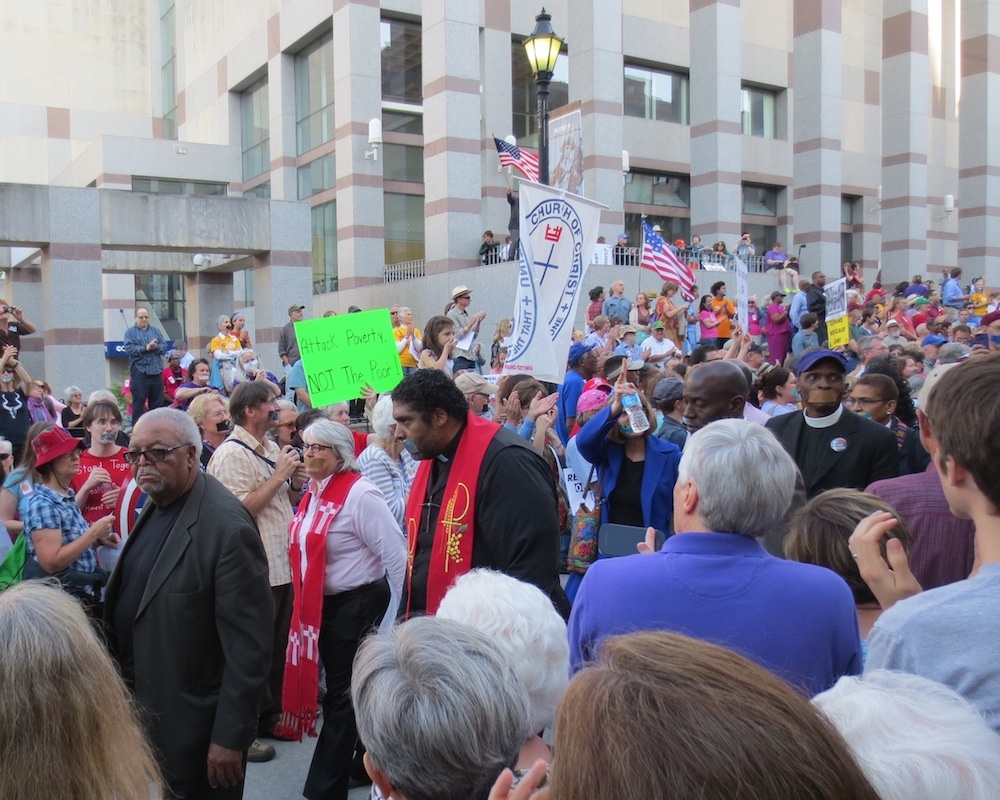As Moral Mondays resume, leaders seek to block NC voter suppression law for upcoming election

The Moral Monday protests that led to the arrests of more than 900 people last year for engaging in civil disobedience have returned to the North Carolina legislature, with several thousand people gathering outside this week as lawmakers convened for the first full week of the 2014 short session.
Following speeches by protest leader and N.C. NAACP President Rev. Dr. William Barber and others decrying the extremist policies of the Republican-controlled legislature, the protesters broke pieces of bread from loaves passed through the crowd as part of a love feast, an ancient Christian ritual carried out to symbolize the protesters' moral conviction that there is more than enough to meet everyone's need. Among the policy changes the protesters are calling for are Medicaid expansion, restoration of the state earned income tax credit, a reversal of cuts to unemployment benefits, and restoration of curtailed voting rights.
The protesters then placed tape over their mouths and filed silently through the General Assembly building to dramatize their opposition to rule changes a legislative committee approved last week without public debate that prohibit visiting groups from making enough noise to interfere with normal conversation. Before he placed the piece of tape over his own mouth, Barber called the policy change "political tyranny" and said it was "like trying to tape up democracy."
"We do it not to be complicit with the law," he said of the tape, "but to be defiant of the law."
However, Barber promised it would be the last time the protesters would remain silent. Though no one engaged in civil disobedience during this week's protest and no arrests were made, Barber said there was no such commitment for future gatherings. Since next Monday is the Memorial Day holiday, the protesters will convene on Tuesday morning instead for a lobby day before resuming weekly Monday gatherings. The legislature is expected to be in session for at least six weeks.
The same day Moral Mondays returned to Raleigh, the N.C. NAACP and other plaintiffs in an ongoing lawsuit against a restrictive voting law passed last year (House Bill 589, the Voter Information Verification Act) filed a motion for a preliminary injunction in federal court to block the law from being enforced for this year's election, claiming that it would cause "irreparable harm." Analyses have shown the new law would disproportionately affect women, people of color, the elderly, and the poor.
Besides requiring photo ID to vote by the 2016 election, the law also has provisions that are set to take effect this year. They include ending same-day registration, repealing out-of-precinct provisional voting, shortening the early voting period, ending pre-registration for 16- and 17-year-olds, and expanding the power of poll observers and ballot challengers.
"We asked the court to hold an evidentiary hearing in July so the voice of those affected can be heard," said attorney Denise Lieberman of the Advancement Project, a civil rights group that's among those representing the plaintiffs, during a May 20 press conference.
This year North Carolinians will elect a new General Assembly. Other positions up for grabs are a U.S. Senate seat in a fiercely contested race that pits current Republican state House Speaker Thom Tillis against incumbent Sen. Kay Hagan, a Democrat; several congressional seats; and slots on the North Carolina Supreme Court and state Court of Appeals.
The motion to block North Carolina's new voting law comes amid several recent wins in the courts for the Moral Monday movement and its allies.
Last week, a U.S. District Court judge ruled that North Carolina lawmakers involved in crafting the state's new voting law must turn over some of their correspondence and email messages to the plaintiffs. The legislators, who include Tillis and Senate President Pro Tem Phil Berger, had claimed they were protected by legislative immunity. The N.C. NAACP and other groups involved in the lawsuit over the voting law had sued Gov. Pat McCrory, state legislators, and state election board members for the records.
Also last week, a Superior Court judge in Wake County struck down a law passed last year that eliminated tenure for veteran public schoolteachers, ruling that the law violated the U.S. Constitution's contract clause and amounted to the illegal taking of property under the state constitution. At the final Moral Monday protest held last year in Raleigh, teachers showed up by the thousands in red T-shirts to protest the new tenure law and other legislative attacks on public education.
"Thank God for the courts," Barber said during this week's rally. "This movement is on the move, and we're winning every day."
Tags
Sue Sturgis
Sue is the former editorial director of Facing South and the Institute for Southern Studies.
